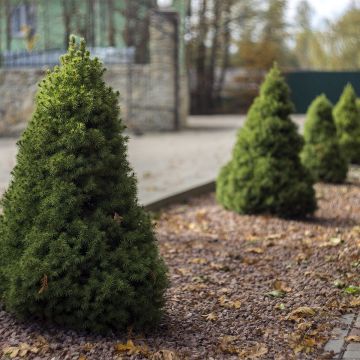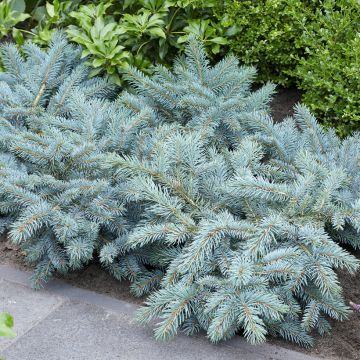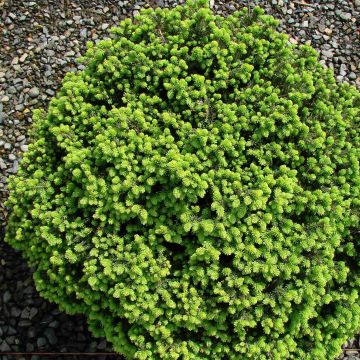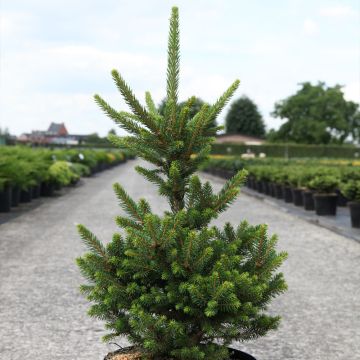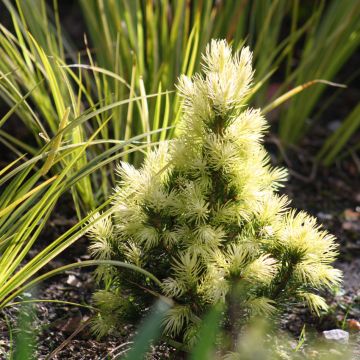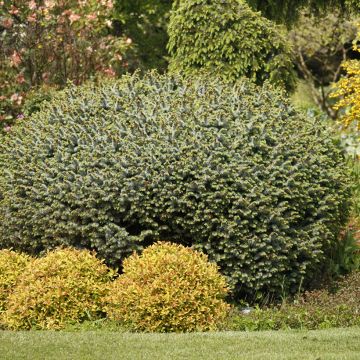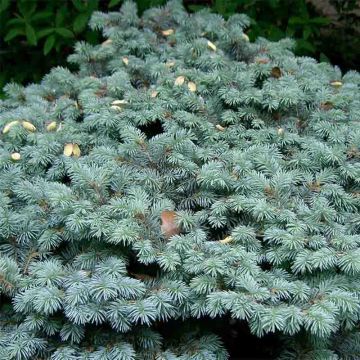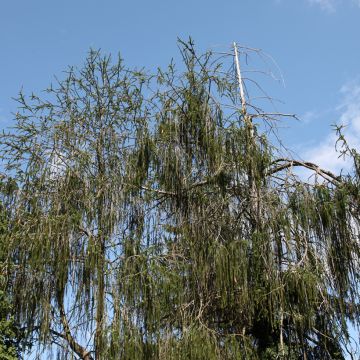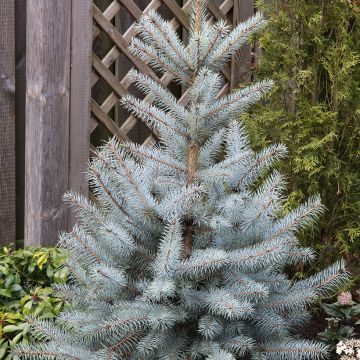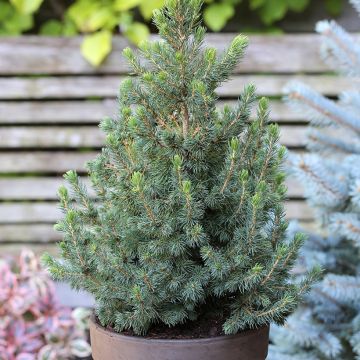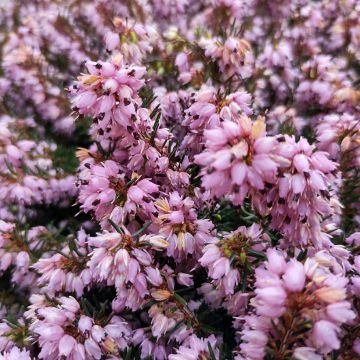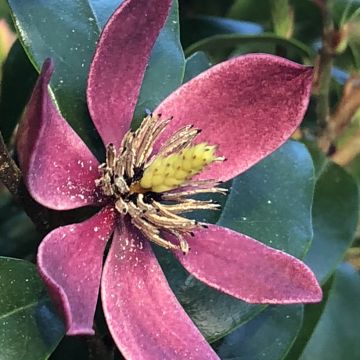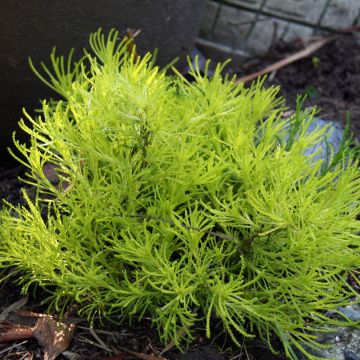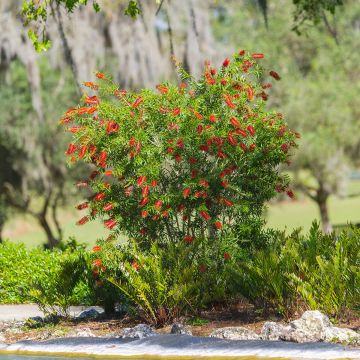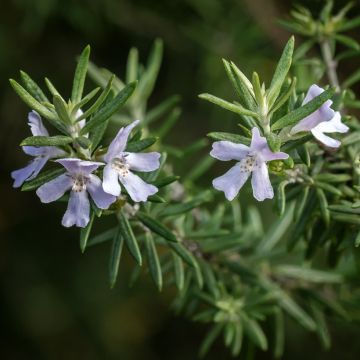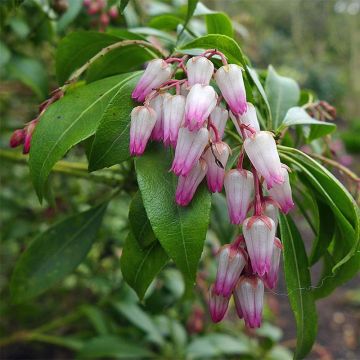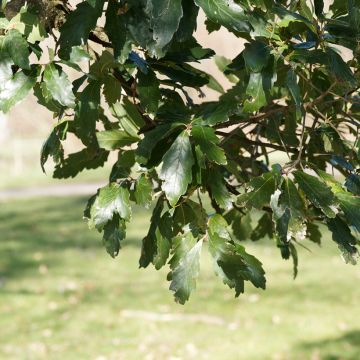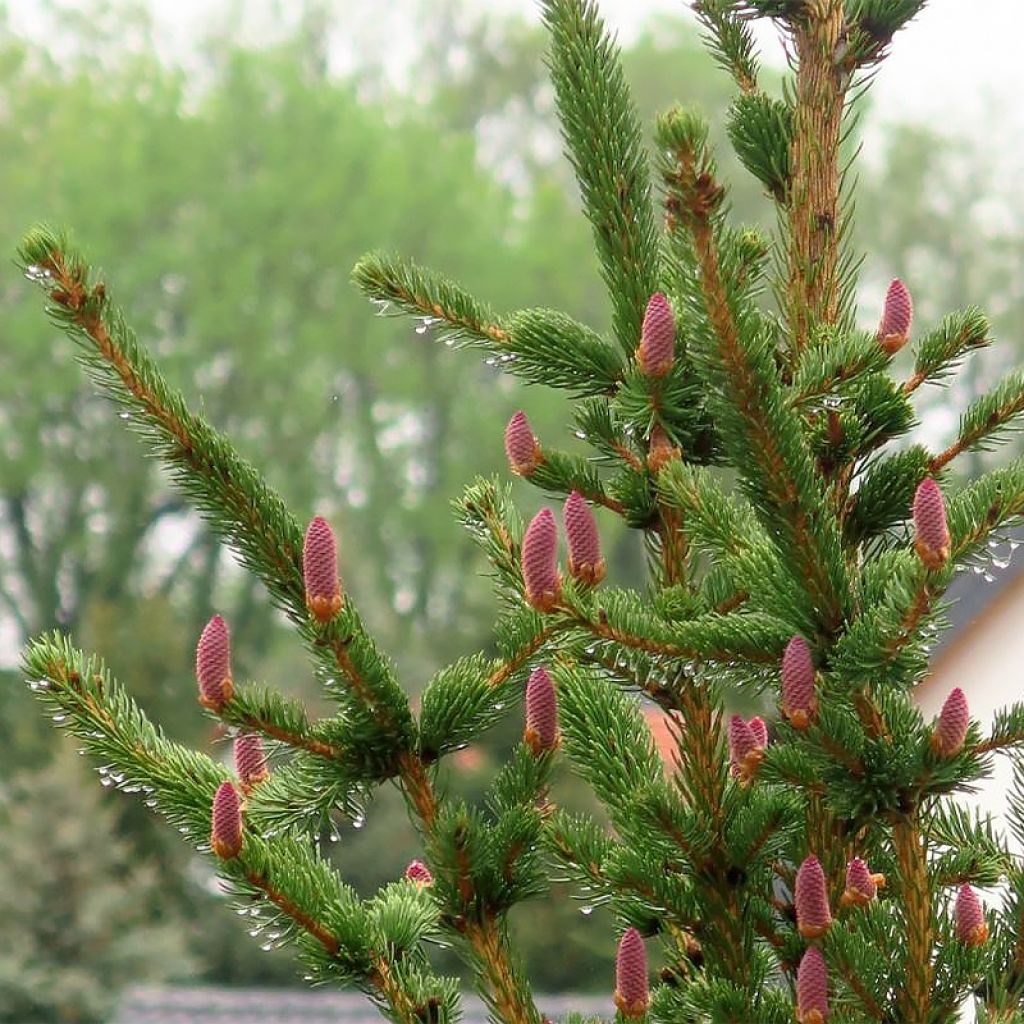

Picea pungens Lucky Strike - Blue Spruce
Picea pungens Lucky Strike - Blue Spruce
Picea pungens Lucky Strike
Blue Spruce, Colorado Blue Spruce, Colorado Spruce, Silver Spruce
Special offer!
Receive a €20 voucher for any order over €90 (excluding delivery costs, credit notes, and plastic-free options)!
1- Add your favorite plants to your cart.
2- Once you have reached €90, confirm your order (you can even choose the delivery date!).
3- As soon as your order is shipped, you will receive an email containing your voucher code, valid for 3 months (90 days).
Your voucher is unique and can only be used once, for any order with a minimum value of €20, excluding delivery costs.
Can be combined with other current offers, non-divisible and non-refundable.
Home or relay delivery (depending on size and destination)
Schedule delivery date,
and select date in basket
This plant carries a 24 months recovery warranty
More information
We guarantee the quality of our plants for a full growing cycle, and will replace at our expense any plant that fails to recover under normal climatic and planting conditions.
Would this plant suit my garden?
Set up your Plantfit profile →
Description
Picea pungens Lucky Strike is a very beautiful variety of Colorado Spruce, whose green foliage is decorative all year round. In spring, the young shoots of tender green animate its more or less pyramidal to conical silhouette. It fruits relatively young, producing elongated cones of a decorative brown-red colour. It is a very good choice for a rockery or when creating a focal point in the garden. It thrives in the sun or partial shade, in well-drained soil, preferably neutral to acidic.
Picea pungens, also known as Colorado blue spruce or blue spruce, is native to the western coast of the United States and the Rocky Mountains of North America, up to Canada. It is a very hardy evergreen conifer belonging to the Pinaceae family, which includes many ornamental genera, such as Pines, Firs, Larches, Cedars, Pseudotsuga, and Tsuga. In its natural environment, the Picea pungens grows slowly, presenting an elegant and regular conical shape with horizontally layered branches. This tree can reach a height of 25 to 40 m (82 to 131ft). The dwarf forms of Colorado spruce tolerate periods of drought once well established.
The 'Lucky Strike' Colorado Spruce, derived from this species, is a Dutch creation from 1983 (Van Vliet Brothers). Not at all blue, its foliage is dark green but covered with a kind of silvery film that gives it an overall medium green colour. It is slow-growing, reaching about 1.20 m (4ft) in height and 1 m (3ft) in width at the age of 10, and can grow up to 2 m (7ft) or slightly more at maturity. Its habit is more or less conical to pyramidal, but often quite irregular, giving it a very natural appearance. It will integrate very well into a rockery or a slightly wild corner of the garden. A fairly dense shrub, its branches bear short needles measuring 2 to 3 cm (1in) in length, with a satin-like appearance. In spring, the young shoots emerge with a beautiful tender green colour, gradually darkening. It fruits quite young, adorning itself with pretty cylindrical and elongated cones measuring 6 to 10 cm (2 to 4in) in length, of beautiful reddish-brown.
This miniature conifer is quite accommodating, adapting to neutral to acidic soils, even slightly chalky, provided they are not too dry. It is very hardy, withstanding temperatures below -20°C. Requiring no maintenance, it is an easy plant to grow and can also be planted in a container to decorate a terrace.
'Lucky Strike' will be well suited in a sunny rockery that is not too dry, alongside shrubs with similar needs. Plant it, for example, alongside the Pinus mugo Ophir, a mountain pine that forms a compact golden yellow ball in winter, turning into a bright light green in season. The compact barberries with coloured foliage will also create superb contrasts by its side, such as the charming Berberis thunbergii Tiny Gold, a dwarf shrub with bright light green foliage, or the delightful Berberis thunbergii Lutin Rouge, a ball of scarlet red turning purple in season. Physocarpus opulifolius Little Joker, a dwarf variety with purple foliage, will brighten up the surroundings of our little Colorado Spruce with its beautiful white-pink flowering in spring. And to cover the ground at its feet, nothing beats the creeping branches of the Juniperus horizontalis Blue Chip!
Report an error about the product description
Picea pungens Lucky Strike - Blue Spruce in pictures
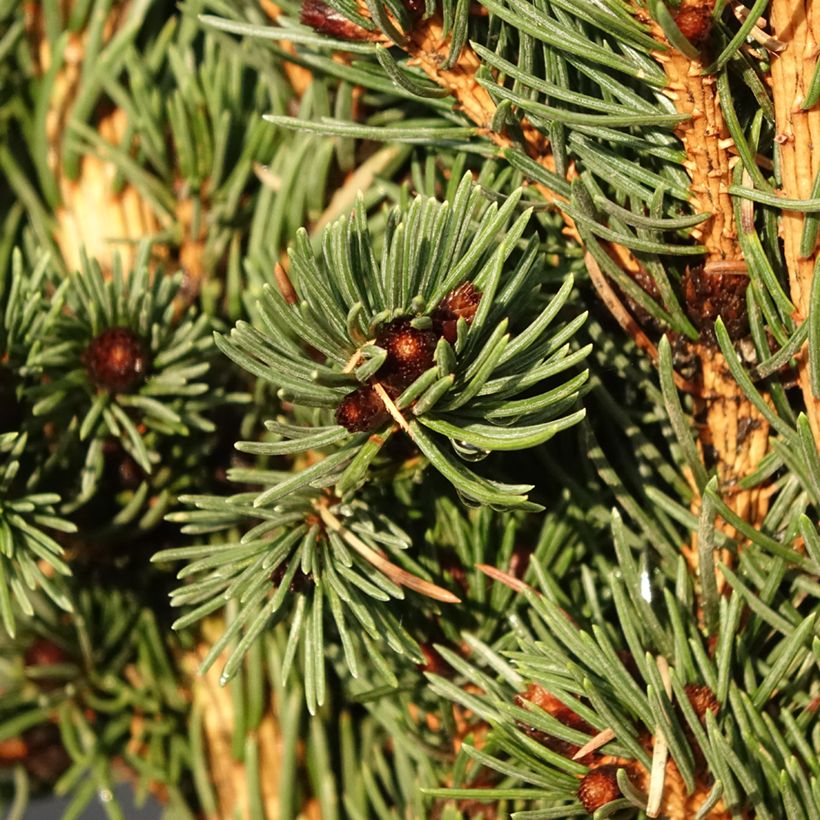

Plant habit
Flowering
Foliage
Botanical data
Picea
pungens
Lucky Strike
Pinaceae
Blue Spruce, Colorado Blue Spruce, Colorado Spruce, Silver Spruce
Cultivar or hybrid
Other Picea
View all →Planting and care
Picea pungens 'Lucky Strike' should be planted from September to November and from February to April in well-drained, light, preferably neutral, or slightly acidic soil. A little limestone is tolerated. A sandy, loamy, humus-rich soil will be perfect. Choose a sunny (or at most partially shaded) spot, sheltered from prevailing winds. In overly wet conditions, it will be more susceptible to root rot. Soak the root ball well in a bucket before planting, add organic fertiliser and water generously for the first two years, and in case of abnormally prolonged drought. Apply a special conifer fertilizer every year in April and hoe the soil in summer. This otherwise extremely hardy conifer, dislikes heavy soils that are waterlogged in winter. Pruning is not necessary, on the contrary, as this plant expresses its full potential when allowed to grow freely. A light pruning in spring will nonetheless be well tolerated.
Planting period
Intended location
Care
This item has not been reviewed yet - be the first to leave a review about it.
Similar products
Haven't found what you were looking for?
Hardiness is the lowest winter temperature a plant can endure without suffering serious damage or even dying. However, hardiness is affected by location (a sheltered area, such as a patio), protection (winter cover) and soil type (hardiness is improved by well-drained soil).

Photo Sharing Terms & Conditions
In order to encourage gardeners to interact and share their experiences, Promesse de fleurs offers various media enabling content to be uploaded onto its Site - in particular via the ‘Photo sharing’ module.
The User agrees to refrain from:
- Posting any content that is illegal, prejudicial, insulting, racist, inciteful to hatred, revisionist, contrary to public decency, that infringes on privacy or on the privacy rights of third parties, in particular the publicity rights of persons and goods, intellectual property rights, or the right to privacy.
- Submitting content on behalf of a third party;
- Impersonate the identity of a third party and/or publish any personal information about a third party;
In general, the User undertakes to refrain from any unethical behaviour.
All Content (in particular text, comments, files, images, photos, videos, creative works, etc.), which may be subject to property or intellectual property rights, image or other private rights, shall remain the property of the User, subject to the limited rights granted by the terms of the licence granted by Promesse de fleurs as stated below. Users are at liberty to publish or not to publish such Content on the Site, notably via the ‘Photo Sharing’ facility, and accept that this Content shall be made public and freely accessible, notably on the Internet.
Users further acknowledge, undertake to have ,and guarantee that they hold all necessary rights and permissions to publish such material on the Site, in particular with regard to the legislation in force pertaining to any privacy, property, intellectual property, image, or contractual rights, or rights of any other nature. By publishing such Content on the Site, Users acknowledge accepting full liability as publishers of the Content within the meaning of the law, and grant Promesse de fleurs, free of charge, an inclusive, worldwide licence for the said Content for the entire duration of its publication, including all reproduction, representation, up/downloading, displaying, performing, transmission, and storage rights.
Users also grant permission for their name to be linked to the Content and accept that this link may not always be made available.
By engaging in posting material, Users consent to their Content becoming automatically accessible on the Internet, in particular on other sites and/or blogs and/or web pages of the Promesse de fleurs site, including in particular social pages and the Promesse de fleurs catalogue.
Users may secure the removal of entrusted content free of charge by issuing a simple request via our contact form.
The flowering period indicated on our website applies to countries and regions located in USDA zone 8 (France, the United Kingdom, Ireland, the Netherlands, etc.)
It will vary according to where you live:
- In zones 9 to 10 (Italy, Spain, Greece, etc.), flowering will occur about 2 to 4 weeks earlier.
- In zones 6 to 7 (Germany, Poland, Slovenia, and lower mountainous regions), flowering will be delayed by 2 to 3 weeks.
- In zone 5 (Central Europe, Scandinavia), blooming will be delayed by 3 to 5 weeks.
In temperate climates, pruning of spring-flowering shrubs (forsythia, spireas, etc.) should be done just after flowering.
Pruning of summer-flowering shrubs (Indian Lilac, Perovskia, etc.) can be done in winter or spring.
In cold regions as well as with frost-sensitive plants, avoid pruning too early when severe frosts may still occur.
The planting period indicated on our website applies to countries and regions located in USDA zone 8 (France, United Kingdom, Ireland, Netherlands).
It will vary according to where you live:
- In Mediterranean zones (Marseille, Madrid, Milan, etc.), autumn and winter are the best planting periods.
- In continental zones (Strasbourg, Munich, Vienna, etc.), delay planting by 2 to 3 weeks in spring and bring it forward by 2 to 4 weeks in autumn.
- In mountainous regions (the Alps, Pyrenees, Carpathians, etc.), it is best to plant in late spring (May-June) or late summer (August-September).
The harvesting period indicated on our website applies to countries and regions in USDA zone 8 (France, England, Ireland, the Netherlands).
In colder areas (Scandinavia, Poland, Austria...) fruit and vegetable harvests are likely to be delayed by 3-4 weeks.
In warmer areas (Italy, Spain, Greece, etc.), harvesting will probably take place earlier, depending on weather conditions.
The sowing periods indicated on our website apply to countries and regions within USDA Zone 8 (France, UK, Ireland, Netherlands).
In colder areas (Scandinavia, Poland, Austria...), delay any outdoor sowing by 3-4 weeks, or sow under glass.
In warmer climes (Italy, Spain, Greece, etc.), bring outdoor sowing forward by a few weeks.






























